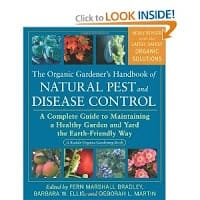Over the last few years, I have been trying my hand at organic gardening. I am learning, quite quickly, that it is NOT easy! Luckily, books like The Organic Gardener’s Handbook of Natural Pest and Disease Control are around. It’s a great help to poor souls like me who just don’t have much of a green thumb!
If you are wondering what natural pest and disease control methods will help get rid of diseases and pests in your yard, this book will become your best friend!
Table of Contents
The Organic Gardener’s Handbook of Natural Pest and Disease Control
What is pest and disease control? Well, this book is going to tell you. AND, it will tell you how to do it naturally so you can avoid all those chemicals in your yard!
Title: The Posts feature partner companies & may be sponsored. Post contains affiliate links & I will be compensated if you make a purchase after clicking on links. As an Amazon Associate I earn from qualifying purchases. Organic Gardener’s Handbook of Natural Pest and Disease Control
Organic Gardener’s Handbook of Natural Pest and Disease Control
Subtitle: A Complete Guide to Maintaining a Healthy Garden and Yard the Earth Friendly Way
Author: Fern Marshall Bradley, Barbara W. Ellis, Deborah L. Martin
ISBN: 978-1605296777
Publisher: Rodale Books
Pages: 416 (paperback)
Genre: Gardening
BUY THIS ORGANIC GARDENING BOOK ON AMAZON
From the Back Cover:
Featuring the most up to date science based recommendations for keeping plants healthy and productive, The Organic Gardener’s Handbook of Natural Pest and Disease Control includes hundreds of organic techniques and products for dealing with garden problems.
You’ll learn how to decided whether you need to treat an infestation or outbreak, how to make choices among the numerous safe, natural options available, and how to use these home remedies and nontoxic control products and methods.

✯Don’t want to miss the next post?✯
Follow Turning the Clock Back on Facebook | Twitter | Pinterest
Or join the private Facebook group for simple tips on going green!
Natural Pest and Disease Control Book Review
There are 4 parts to this book. Part 1 deals with building a healthy garden so that you can grow healthy plants. This section deals with composting, cover crops, and applying healthy supplements such as seaweed spray. (I have never heard of seaweed spray!
I am going to do some research on that!) It also covers topics such as choosing resistant strains of plants and planting at the right time of year.
Even a week or two change in when you plant can help avoid certain pests. I do wish there was more information on heirloom plant varieties, it seems like the hybrid plants offer more resistance to disease, and the fewer diseases, the fewer treatments necessary, however, I love heirloom plants for their uniqueness.
Identifying Pests and Diseases
The second section deals with Symptoms and Solutions and the third is Identifying Pests and Diseases. These are very informative sections that take each individual plant and describe every possible problem you could have with it.
You can search by plant type (begonia, carrots, etc) or disease type (fungal, viral, bug, etc)
There are some not so pretty pictures to help you identify your garden pest. I discovered that the spooky-looking critter on my grape leaves is a leaf hopper. Now, I just move on to the next section on how to get rid of him!
Earwigs are a particular problem in my garden. Check out my DIY earwig trap if you have the same garden pest I do!
More Organic Gardening Tips
- Cheap and Natural Organic Gardening Solutions for Frugal Gardening!
- Tips for Organic Gardening Success
- Use These 10 Foods in Your Organic Garden!
How to get rid of your unwanted pest or disease
The last section is an extensive collection of how to get rid of your unwanted pest or disease. It includes biological controls, organic sprays, and dust, making your own homemade solutions, and planting things that repel other insects.
This is a very thorough chapter and ends with a resource section that you can use to help find the ingredients that are mentioned in the book. Which is a great thing because none of the stores around here I have looked in carry diatomaceous earth and that seems to be a popular pest control method.
I highly recommend this book to anyone trying to grow an organic garden. It is not easy to do but this book will go a long way in making your garden more productive and help you spot issues early before they get out of control.

Diane is a professional blogger and nationally certified pharmacy technician at Good Pill Pharmacy. She earned her BS in Microbiology at the University of New Hampshire and has worked in cancer research, academics, and biotechnology. Concern over the growing incidence of human disease and the birth of her children led her to begin living a more natural life. She quickly realized that the information she was learning along the way could be beneficial to many others and started blogging and freelance writing to share this knowledge with others. Learn more about her HERE.
